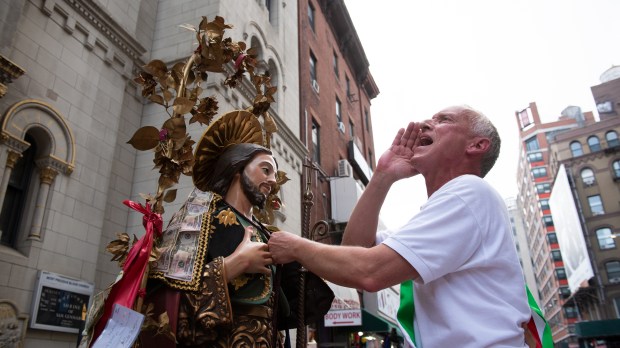Always be ready to give an explanation to anyone who asks you for a reason for your hope
For many Catholics, believing begins as a family affair. We receive our faith from our parents and grandparents. And thank God for their love of the precious gift of faith! It is the greatest thing any parent has to give a son or daughter.
If we are raised with faith, we often hardly recognize it. It’s like asking a fish to talk about water. Faith surrounds us, sustains us. Growing in faith is synonymous with growing up: Baptism, First Communion, Confirmation, Marriage (or an ecclesial vocation!), and the holy Anointing which precedes our death. The sacraments are the signposts of Catholic life. We age, and we grow in faith.
But sometimes things aren’t always that smooth. Growing does not necessarily mean growing in faith. Tragically, in some lives, it means growing out of, or growing away from…
For most people the loss of faith, it seems to me, occurs slowly. This is not a thought experiment: A third of millennials identify as “religiously unaffiliated.” How does this happen to Catholics? They skip a Sunday Mass here or there. A bad experience with a priest or Church leader becomes a source of deep pain and frustration. Daily prayers fall by the wayside.
In my experience when people fall away from faith, it’s often best described as a slipping away, rather than a formal renunciation.
So what do we do? In places where the faith was once lively, even a dominant force in society, people think they know what the Church has to offer, and so they’re uninterested. They seem, rather than bolstered by catechesis, almost inoculated against the faith.
We have to be hopeful. Not pollyannaish; rather confident. Today the Scriptures tell us, “Always be ready to give an explanation to anyone who asks you for a reason for your hope.” (1 Pet 3:15). Do you have a reason? Are you ready to share it?
In places where people know the Church, even have been wounded by members of the Church, we have to think seriously about our testimony. These, I think, are the two key things that must shape our testimony.
1Beauty
The modern person looks down. We look down into cell phones, tablets. We look down on roads as we walk and drive. We now market devices to help people to correct their posture (there are such things as little electronic buzzers that will remind a slouching desk jockey to sit up)!
More than anything else, we need to look up. As a community, we need a Renaissance to inspire the growth and resurrection of beautiful liturgy, liturgy which speaks to all our senses and helps us look to the heavens in wonder. Far from being simply nostalgic or the over-glorification of a once valorous past, “the smells and bells” of solemn worship storm the vacuity of our broken political discourse and offer transcendence in place of drudgery. I was recently told my parish church “smells right.” I was delighted by this remark.
Roger Scruton once wrote,
The quasi-aesthetic absorption in the holy words and gestures is a component in the redemptive process. In participating, the believer is effecting a change in his spiritual standing. The ceremony is not so much a means to this end, as a prefiguration of it. In the ritual the believer confronts God, and is purified by standing in God’s gaze.
Beautiful and holy liturgy, without perhaps we even perceiving it, changes our hearts; it lifts them up.
But as individuals, we need to be ready in our hearts to tell our own stories of faith in beautiful ways. Write letters to your sons and daughters. Hang beautiful Christian art in your home (especially the Sacred Heart and the Virgin Mary!). Post beautiful images on social media. Help those around you to look up.
Beauty compels us. Beauty itself speaks of greater things. Beauty lifts up hearts.
2Truth
Our hearts were not only made for beauty. We were made for truth. We long to know. Our culture is plagued by the cries that there is no truth or that there is only “my truth.” For the believer, there is only Christ, who is the Way, the Truth, and the Life.
I have been teaching college students theology these past few years, and in many cases they are proud to share with me that they are products of Catholic education. On the first day of the semester they tell me, “Father, I’ve had 12 years of Catholic school, so I got this.” So then I ask them to name the seven sacraments. I am lucky if they name three.
How do we express what is true and important to us? This is the question we must ask ourselves. I hope in these weeks we have realized a greater desire, even a need for the Eucharist… how will you talk about that? How can you share the truth of your relationship with Christ, the truth of your very need for Him? How can we do so with people who think they know that truth? How can we, in all charity, clarify false or partial proclamations?
This Sunday of Easter, the Lord invites us to turn to Him. He tells us,
And whoever loves me will be loved by my Father, and I will love him and reveal myself to him.
Ask the Lord this Sunday to reveal Himself to you in beauty. Ask Him to reveal Himself to you in Truth. Ask the Lord to prepare your heart, for we must “always be ready to give an explanation to anyone who asks you for a reason for your hope.”

